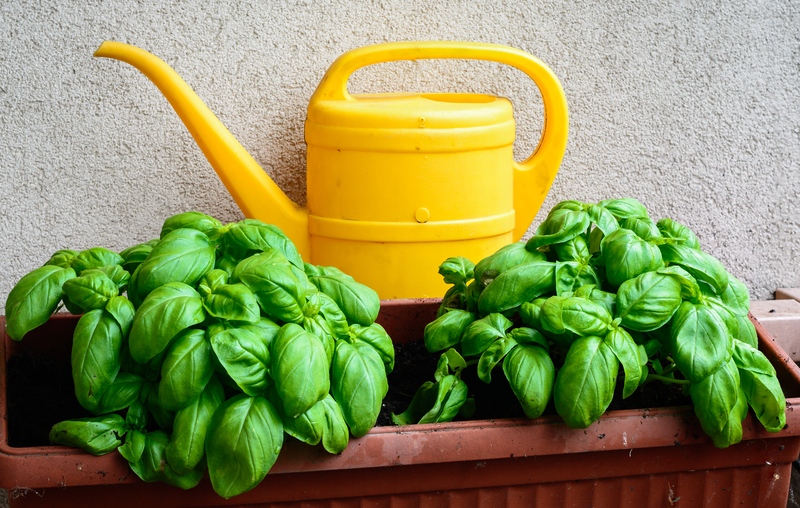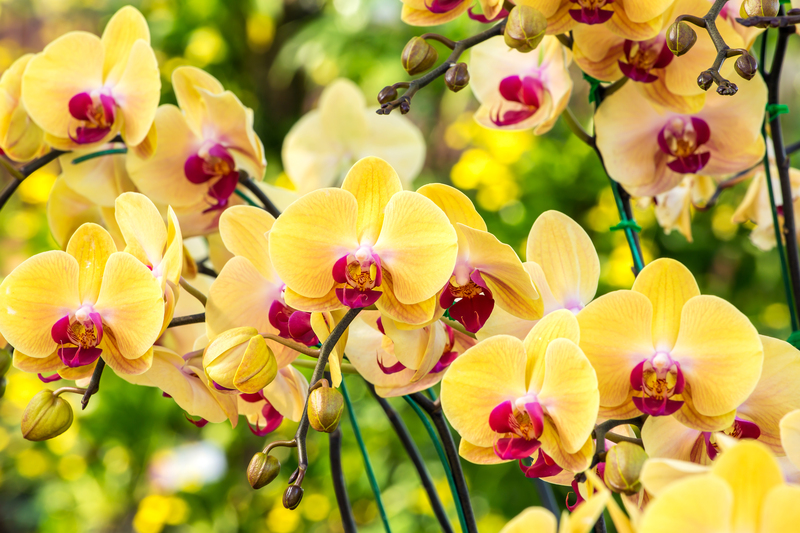Composting: Converting Waste into Garden Gold
Posted on 17/06/2025
Composting: Converting Waste into Garden Gold
Composting has become a revolutionary method for dealing with organic waste while enriching your garden soil. Rather than sending food scraps and yard waste to overcrowded landfills, composting transforms these materials into a nutrient-rich amendment some gardeners enthusiastically call "garden gold."
If you're curious about composting or want to optimize your waste-to-soil process, this comprehensive guide will take you through the science, benefits, methods, and troubleshooting techniques for transforming kitchen and yard waste into a sustainable asset for your garden.
What Is Composting?
Composting is the natural process of recycling organic matter--such as food scraps, leaves, and grass clippings--into a valuable fertilizer that can enrich soil and plants. This transformation is fueled by microorganisms, fungi, and insects that break down the organic materials, turning waste into compost, a dark, crumbly material packed with nutrients.
Why Is Composting Important?
The significance of composting cannot be overstated. Here's why turning waste into garden gold is crucial:
- Reduces landfill waste: Food and garden waste make up roughly 30% of what we throw away. Composting diverts this from landfills, reducing environmental impact.
- Enriches soil: Finished compost adds essential nutrients, improves soil structure, and promotes healthy plant growth.
- Reduces greenhouse gases: Organic waste decomposing in landfills generates methane--a potent greenhouse gas. Composting keeps this in check.
- Saves money: Compost is a free, sustainable alternative to store-bought fertilizers and soil amendments.

The Science Behind the Composting Process
Understanding the biology of composting is the first step to successful waste conversion. Microorganisms--mainly bacteria and fungi--are the primary engines of decomposition. These organisms need four key elements:
- Carbon: Supplies energy for microbes (typically found in "browns" such as dry leaves, straw, and cardboard).
- Nitrogen: Aids in protein synthesis (abundant in "greens" like vegetable scraps, grass clippings, and coffee grounds).
- Water: Moisture aids microbial activity; too little slows down composting, too much can cause odors.
- Oxygen: Aerobic microbes need oxygen to thrive and efficiently break down materials.
The balance of these components is crucial. A basic rule is to mix three parts brown materials (high carbon) to one part green materials (high nitrogen).
Composting Methods: Choose Your Approach
Composting methods vary depending on space, labor, and waste types. Here are the most popular approaches:
Backyard Composting
The traditional method, backyard composting involves creating a pile or using a bin in your yard. This is ideal for homeowners with garden space and a steady supply of organic waste.
- Open pile: Simply layer and mix browns and greens in a heap.
- Compost bin: A contained bin helps deter pests and contains odors.
Vermicomposting
This method uses red wiggler worms to break down food waste in a controlled bin. Vermicomposting produces a nutrient-rich castings or "worm compost," often prized for seed starting and container gardens.
Tumbler Composting
A compost tumbler is a drum that you rotate to aerate the materials inside. Tumblers speed up breakdown, manage moisture and pests, and are easy to use for smaller spaces like patios or balconies.
Bokashi Composting
Bokashi is an anaerobic fermenting process that handles kitchen waste, including meat and dairy, using a special inoculant. The end result is a pre-compost material, which you bury in the soil to finish composting.
Community Composting
Don't have space? Many urban communities, schools, and gardens operate community composting programs where you can drop off your organic waste to be processed into garden compost.
What Can (and Can't) Be Composted?
One of the keys to effective composting is knowing what materials are appropriate for your bin or pile. Here's a quick guide:
Compostable Materials (The "Greens" and "Browns")
- Greens (Nitrogen-rich):
- Vegetable scraps
- Fruit peels and cores
- Coffee grounds and filters
- Tea leaves and bags (unbleached, without staples)
- Grass clippings (fresh)
- Eggshells (crushed)
- Browns (Carbon-rich):
- Dead leaves
- Straw and hay
- Paper (uncolored, shredded)
- Paper towel and napkins
- Cardboard (shredded)
- Sawdust (untreated wood)
Do Not Compost
- Meat, fish, dairy (unless Bokashi composting)
- Oily, greasy food scraps
- Pet waste or cat litter
- Diseased plants or weeds with seeds
- Glossy or heavily printed paper
- Coal or charcoal ash
- Synthetic fibers or plastics
Step-by-Step Guide to Composting at Home
Ready to turn your kitchen and yard waste into garden gold? Follow these simple steps:
1. Set Up Your Composting Area
- Choose a dry, shady spot near a water source.
- Select a compost bin, pile, tumbler, or worm bin based on your needs.
2. Collect Compostable Materials
- Keep a small pail or bucket in your kitchen for scraps.
- Shred larger materials to speed up decomposition.
3. Build Your Pile
- Start with a layer of coarse carbon material (twigs, straw or cardboard).
- Add alternating layers of greens and browns.
- Moisten as you build--compost should feel like a wrung-out sponge.
4. Maintain the Compost
- Turn or aerate the pile every 1-2 weeks to inject oxygen and mix materials.
- Monitor moisture; add water if too dry, or browns if too wet.
- Watch temperature--the center should heat up (100-150?F is ideal for hot composting).
- Add new materials as you accumulate them, mixing them in.
5. Harvest Your Compost
- Finished compost will be dark, crumbly, and earthy smelling, with no recognizable food scraps.
- Sift or screen to remove larger pieces (can return these to the pile).
- Use compost to top-dress gardens, fill planting holes, or make potting mixes.
Troubleshooting Composting Problems
Sometimes, converting waste into garden gold isn't as straightforward. Here's how to handle common hiccups:
Pile Is Not Decomposing
- Check the carbon-to-nitrogen ratio; balance greens and browns.
- Moisten dry piles; aerate compacted piles.
- Chop materials smaller, or add finished compost to inoculate microbes.
Pile Smells Bad
- A rotten or ammonia smell may mean too many greens or lack of oxygen.
- Mix in more browns and turn the pile to aerate.
Pests in the Compost
- Don't add meat, dairy, or oily foods.
- Bury fresh scraps in the center of the pile or cover with browns.
- Consider a closed bin if wildlife is persistent.
The Benefits of Compost: Transforming Your Garden
The best part of composting is how it transforms not just waste, but your garden. Here's a roundup of compost's many benefits:
- Boosts soil health: Compost improves soil texture, aeration, and water retention.
- Feeds beneficial microbes: Healthy soils teem with life, which helps plants resist pests and disease.
- Reduces erosion and runoff: Better soil structure means more rain is absorbed, less is lost.
- Encourages robust plant growth: Plants grown in compost-rich soil are often stronger and more productive.
- Promotes sustainability: Composting closes the nutrient loop, keeping resources out of landfills and in your yard.
FAQs About Composting
How long does it take to make compost?
Depending on method and conditions, composting can take from a few months (hot composting) to a year (cold composting). A hot, well-tended pile can yield compost in 2-4 months.
Can I compost in an apartment or small space?
Absolutely! Worm bins and compost tumblers are compact and perfect for balconies or kitchens.
Does compost attract rodents?
If you avoid meats, dairy, and cooked foods and keep your pile covered with browns, composting should not attract pests. Using a closed bin helps too.
What can I do with finished compost?
Spread it on garden beds, dig into planting holes, top-dress lawns, make tea for seedlings, or even give away to neighbors!

Tips for Creating Perfect Garden Gold
- Chop materials: Smaller pieces decompose faster.
- Maintain temperature: Turn your pile to keep the center hot for fast and pathogen-free composting.
- Balance inputs: Remember: three parts browns to one part greens.
- Let it cure: Allow finished compost to sit for a few weeks before using; this ensures all residues are broken down.
- Blend and sift: Screening compost makes it perfect for pots and seed beds.
Conclusion: Transform Waste, Grow Abundance
Composting is a simple, natural act with profound benefits for your garden, your wallet, and our entire planet. By transforming what once was waste into a nutrient-packed amendment, you're closing the loop--nourishing the soil, supporting local ecosystems, and reducing pollution. Whether you choose a traditional pile, a neat tumbler, a worm bin, or any method in between, you are taking part in the ancient, miraculous process of turning everyday refuse into something priceless: garden gold.
Ready to join the composting movement? Start today and discover how easy it is to convert waste into fertile, living soil. Your plants--and the planet--will thank you.
Latest Posts
Expert Advice: 3 Tips for Winning the War on Weeds
Transform Your Garden into a Child's Dream Playland
Cold-Weather Strategies for Garden Protection

